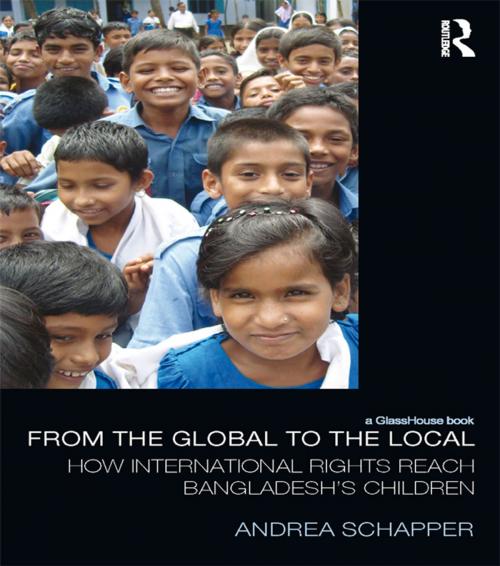From the Global to the Local
How International Rights Reach Bangladesh's Children
Nonfiction, Reference & Language, Law, Child Advocacy, International| Author: | Andrea Schapper | ISBN: | 9781135070052 |
| Publisher: | Taylor and Francis | Publication: | November 7, 2013 |
| Imprint: | Routledge | Language: | English |
| Author: | Andrea Schapper |
| ISBN: | 9781135070052 |
| Publisher: | Taylor and Francis |
| Publication: | November 7, 2013 |
| Imprint: | Routledge |
| Language: | English |
From the Global to the Local develops a unique perspective on human rights governance in developing countries, where the state often lacks the required resources, capacities and expertise for implementing rights. Considering how rights that have been agreed upon in the global arena of world politics are locally implemented, this book then specifically explores how they reach the local children of Bangladesh’s urban slums and poor rural areas.
Andrea Schapper combines an analytical framework grounded in international relations scholarship on global governance with empirical field research methods that have their basis in sociology and anthropology. Utilising this methodology, the book examines three principles that represent a global consensus on children’s rights (the protection of children from the worst forms of child labor, providing them with primary education, and delivering basic health care services to them) to illuminating the need for local and contextual solutions to transnational issues.
Exploring such concerns with vigor, this book fills a gap in the study of human rights implementation and protection and will thus be of immense interest to students of Law, of International Relations and of Development Studies.
From the Global to the Local develops a unique perspective on human rights governance in developing countries, where the state often lacks the required resources, capacities and expertise for implementing rights. Considering how rights that have been agreed upon in the global arena of world politics are locally implemented, this book then specifically explores how they reach the local children of Bangladesh’s urban slums and poor rural areas.
Andrea Schapper combines an analytical framework grounded in international relations scholarship on global governance with empirical field research methods that have their basis in sociology and anthropology. Utilising this methodology, the book examines three principles that represent a global consensus on children’s rights (the protection of children from the worst forms of child labor, providing them with primary education, and delivering basic health care services to them) to illuminating the need for local and contextual solutions to transnational issues.
Exploring such concerns with vigor, this book fills a gap in the study of human rights implementation and protection and will thus be of immense interest to students of Law, of International Relations and of Development Studies.















